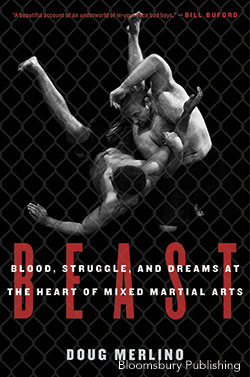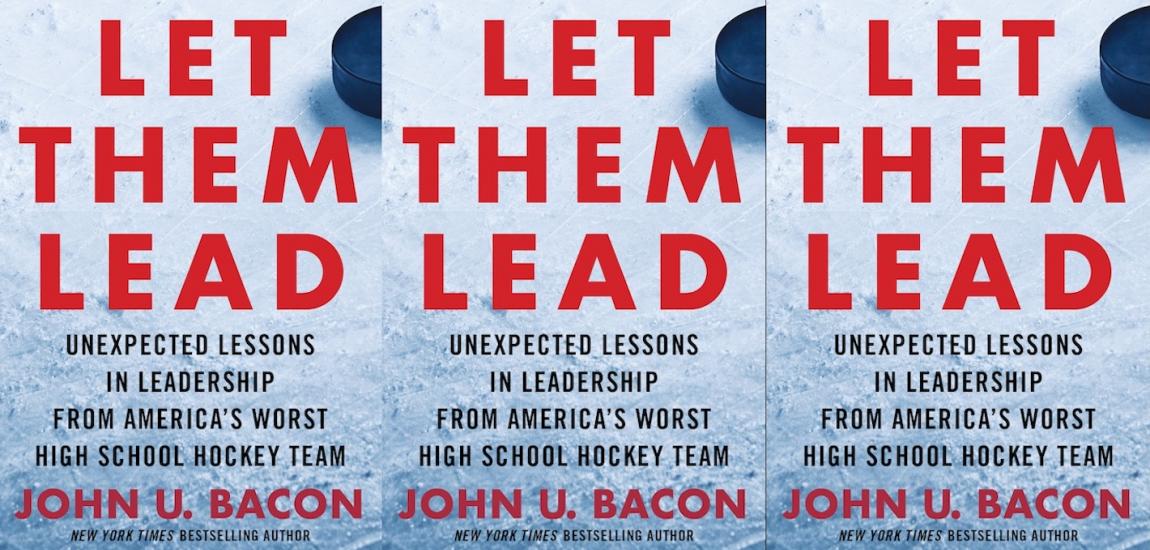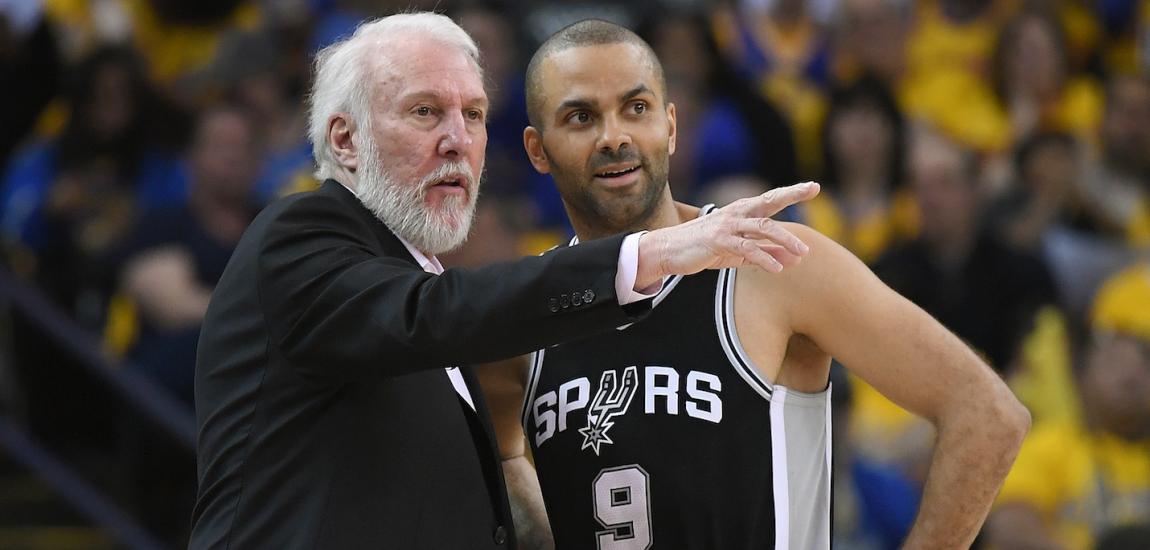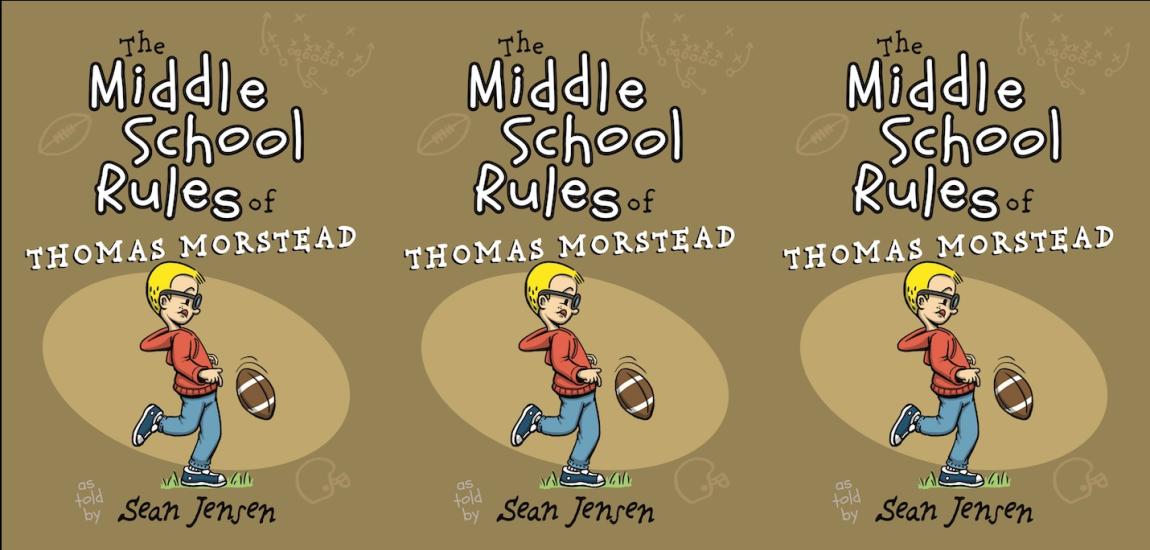Mixed martial arts is America's fastest-growing sport. Around the country, new gyms open their doors as enthusiastic viewers tune in to UFC matches. Beast: Blood, Struggle, and Dreams at the Heart of Mixed Martial Arts by Doug Merlino follows four high-level fighters at one of the sport's elite gyms, Florida's American Top Team. One of them is a young Bosnian refugee, who started in karate as a boy in Nebraska, dreaming of stardom. Mirsad Bektic's story is part of Merlino's detailed account about the history, culture, business and meaning of professional cage fighting. Here is an excerpt.
On the afternoon of the fight, Mirsad Bektic walked out of the Best Western hotel in Kearney, Nebraska, to get some air. He was joined by his coach, Kami Barzini, and his friend, roommate, and fellow fighter, Sirwan Kakai. It was sunny and mild, surprisingly pleasant for late November in Nebraska. Even the smell of manure, which only a few hours earlier had wafted through the air, had dissipated.
Bektic, having made his 145-pound weight limit the day before, appeared the most relaxed of the three. As was his habit, he'd taped printouts of motivational sayings throughout his hotel room. On his bathroom mirror:
I AM A WORLD CHAMPION
I'M READY FOR WAR!!
THANK YOU MY GOD,
FOR MY HEALTH AND MY DESIRE TO WIN!!
Bektic was twenty-one. He'd just been the subject of a "Prospect Watch" profile on Sherdog, a popular mixed martial arts website. A film crew had trailed him for several days to produce a series that touched on all of the points that made Bektic stand out in a sport overflowing with young hopefuls: his "war-torn" background; his athleticism; his habit of being the first to arrive and last to leave the gym; his total dedication to training as if dominance in the cage held the key to everything he wanted -- respect, dignity, a life that would be better than average.
Tonight, his journey led through Kearney, a farm-country stopover on Interstate 80 between Omaha and Denver. Bektic and Barzini hadscouted YouTube videos of Doug Jenkins, the night's opponent. Nothing had raised alarm. Jenkins, a twenty-five-year-old fighter from South Dakota, had been in some scraps, but his technique was lacking. The conclusion: tough kid, but beatable; just another aspirant among the countless with more heart than skill.
Bektic, Kakai, and Barzini followed a path that led away from the hotel parking lot. They walked next to a barren field, toward the freeway that rumbled with the passing of semi-trucks. All three recognized the oddness of lives that had brought them from their foreign birthplaces to a weekend fight card in the American Midwest.
Kami Barzini, the coach, had grown up in Tehran during the Islamic Revolution and the Iran-Iraq War, catastrophes that had devastated his family. Sirwan Kakai, a Kurd, was born in a refugee camp in the Kurdish part of Iraq; he had immigrated to Sweden when he was four. Mirsad Bektic's mother had fled Bosnia with him when he was only a baby, ahead of the killers who would bring mass murder to their home village. He had grown up not far from here, part of a large Bosnian community in Lincoln, Nebraska.
At thirty-four, Kami Barzini was a solid five foot eight, his head shaved close to the scalp with stubble on his chin to match. He was a quiet man with a connoisseur's taste in beer and a spiritual bent, guiding his interests from Gandhi to the Zoroastrian religion to Sufi poetry.
Mirsad Bektic and Sirwan Kakai, dressed in identical gray-and-white sweat suits, jostled one another as they walked side-by-side. They did everything together: They shared a house in Florida a short walk from their gym; since Kakai fought at 135 pounds, just ten pounds under Bektic, they were often sparring partners; on weekends, they went to the beach together. Both were among the top prospects in their weight classes in the sport: Bektic's professional record was 4-0; Kakai's was 8-1.
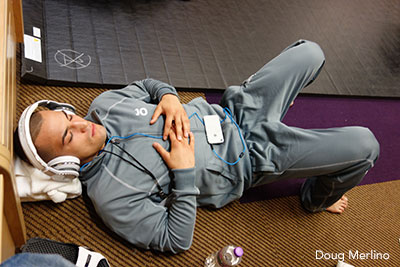
They came to a drainage lake next to the freeway. It was as far as they could go. Bektic handed me his phone and the three posed for a photograph, the two fighters, in their matching outfits, flanking the coach. Bektic made a fist. All three squinted into the sun as the phone clicked.
The arena, an aluminum-sided building that looked like a giant shed, was normally the home of a minor-league hockey team. In the locker room, Bektic pulled on his headphones, lay back on the floor, closed his eyes, and listened to Tupac. Kakai had fought two months earlier and won; now Bektic knew the focus was on him. Earlier in the day, while working out at the hotel, his hands had felt a little heavy. Had he fully rehydrated from his weight cut? He'd seen all the people on Facebook writing that he was going to destroy his opponent. What would happen if he lost?
He redirected his mind: You've trained hard, you're ready, just go out and do what you've prepared to do.
The undercard fighters warmed up, grappling and hitting mitts on a black mat spread across the center of the room. Only the faintest sounds from the arena penetrated the concrete walls. What transpired in the cage became clear as fighters reentered the locker room, the winners jaunty, slightly crazed, arms around their corner men. Losers came quietly, heads down, lips pursed.
In a sport with thousands of hopefuls, every loss was a potentially fatal roadblock to further advancement. The Resurrection Fighting Alliance, the promotion Bektic was fighting in that night, was mid-tier -- far above the fights held in bars, strip clubs, and school gyms, but a step below the UFC or Bellator, the second-place organization in the sport. It was a developmental league for those higher levels.
To move ahead, even the winners needed more than just a victory: They had to impress physically, ideally ending their fights with a knockout or submission before the three five-minute rounds expired. If they possessed that bit of extra charisma or a nice backstory -- anything that set them apart on television -- so much the better. But for nearly all the fighters on the card, this level was as high as their careers were going to go.
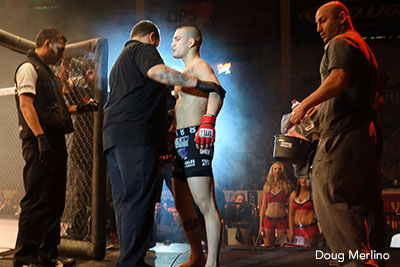
Bektic grappled with Kakai on the mats, Barzini observing from a few feet away. Bektic's hands were wrapped with white athletic tape. Four-ounce fingerless gloves had been pulled over them and sealed with strips of red duct tape around his wrists. His black shorts, which clung to his muscular thighs, bore his website address and an advertisement for an Omaha car dealership.
Bektic tackled Kakai to the mats, stood, shook out his arms, breathed in around his mouth guard. The main card, including his fight, was to be televised nationally on cable. Bektic's teammates and coaches back in Florida would be watching. He wanted them to see his best performance. A man with a clipboard appeared. "Bektic!"
Kakai and Barzini led him from the locker room. They entered darkness: One third of the hockey arena had been draped off, black curtains hanging from the ceiling to the floor. Plywood had been spread over the ice, and a chill shot up through the seams. A set of stairs led through an aluminum trellis and down a gangway to the cage.
One hundred feet ahead of Bektic, his opponent, Doug Jenkins, huddled with his corner men. When his name was called, Jenkins climbed the stairs and disappeared.
A few thousand spectators from central Nebraska's Tri-Cities -- Grand Island, Hastings, and Kearney -- filled the arena for the Friday night fights. Baseball caps and flannel shirts were abundant; blue aluminum bottles of Bud Light overflowed the arena's garbage cans and spilled onto the floor.
One section had filled with several dozen Bosnians, including Bektic's older brothers, Senad and Suvad, who had made the two-hour drive from Lincoln. Several of the Bosnians waved the blue and yellow flag of their home country.
Most of these men -- many of whom had been using the preceding hours to catch up on drinking -- Bektic barely knew. Since the early 1990s, when civil war had devastated what was Yugoslavia, several thousand Bosnian refugees had arrived in Lincoln. Some had done well, others had struggled, especially those that had been older. Bektic felt that many had placed their hopes on him as a symbol of Bosnians making good in the United States.
He cringed as his fans greeted Jenkins with a cascade of boos.
It was Bektic's turn. He emerged onto the gangway through a blast of red-lit dry ice. A cameraman backpedaled a few feet in front of him as his walkout music kicked in:
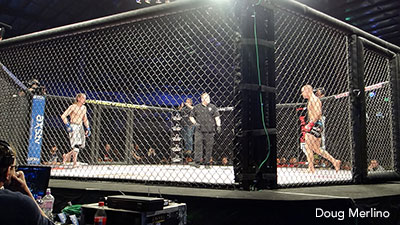
The Bosnians exploded. Mirso! Mirso! Mirso!
Bektic reached the stairs up to the cage and pulled off his shirt, revealing a chiseled torso devoid of fat. BELIEVE was tattooed above his heart. He was handsome, with high cheekbones, black hair shaved closed to the scalp, cauliflower ears that jutted from his head, and forceful eyes. A man from the state athletic commission, which was responsible for regulating the event, rubbed Vaseline around Bektic's eyes and cheeks to help prevent the punches from Jenkins's leather gloves from lacerating his face.
Bektic climbed the stairs to the cage, jogged around it once, and then paced as Jenkins mirrored him on the other side.
The ref called the fighters to the center and advised them to protect themselves at all times. They touched gloves and returned to their corners.
Jenkins shook out his hands.
Bektic faced him, left leg forward, and rocked back and forth, fists clenched.
At the sound of the bell, he blasted across the cage.
They met in a flurry of punches. Bektic ducked down, grabbed Jenkins around the waist, lifted him, and slammed him to the mat.
Bektic was the heavy favorite, and Jenkins had seemed even less of a threat when they met at the weigh-in the day before: With his long hair falling down around his face, a goatee, and a frame that was emaciated at 145 pounds, he had looked, in Barzini's curt description, like a junkie.
Now, however, his straggly hair was pulled back and tied up, and his body, after rehydration, had filled back out. As he worked to grab Bektic's arms and limit the damage he could inflict, it was clear the South Dakotan was not going to go easily.
After two minutes on the ground, Bektic had planted Jenkins on his back and straddled his hips -- the full mount position -- ideal to smash down fists and elbows on his face. Jenkins struggled to grasp Bektic around the shoulders and pull him close to halt his strikes. At the same time, he maneuvered his feet to the fence of the cage. He gained traction and pushed, throwing Bektic off.
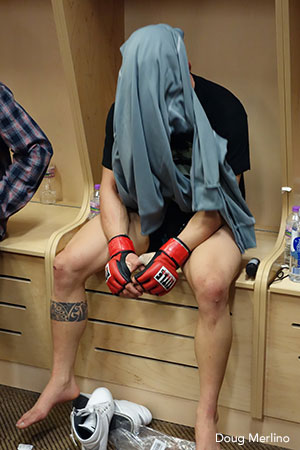
The fighters scrambled to their feet. Jenkins swung looping punches that came from the side at odd angles. Bektic trained six days a week, most often morning and night, working on wrestling, jiu jitsu, and striking. He had several sessions a week with Muay Thai and boxing coaches, who taught him to circle, use head movement, and slip to avoid sloppy punches such as these. Still, they were dangerous -- with the light four-ounce gloves used in cage fighting, a single punch landed in the right spot could put you to sleep.
"Be patient!" Barzini urged from the corner.
Bektic knew he should wait for his openings, but as the crowd brayed and Jenkins came at him, he wanted to brawl. He pressed forward.
Jenkins threw a right that hit flush on the side of Bektic's face. Suddenly, Bektic's momentum reversed and he was falling back toward the canvas.
In his bedroom back in Florida, Bektic had taped a printout of a title belt of the Ultimate Fighting Championship to his bulletin board. When he woke up, he liked to stay in bed for a few minutes and look at it, visualizing his route to the title, all the hurdles he would overcome, all the sacrifices he would make, how amazing it would feel when he achieved his dream.
In a different time and a different America, Bektic might have tried his luck on the Western frontier, shipped out to sea, or found himself in a boxing ring. Now, in a media-saturated world hungry for stories of personal triumph in the face of long odds, he was stripped down to his shorts, fighting for his future on cable television.
But fighting is a zero-sum game: For one fighter to move ahead, his opponent has to take a step back. Though unheralded, Doug Jenkins did not want to be another stone on Bektic's path to glory.
Bektic fell backward, as if he'd been trying to sit down and somebody had pulled away his chair. With his ass inches from the canvas, he twisted his body, shot his left hand back to the canvas, and bounded back to his feet.
Jenkins charged, pushing Bektic to the cage. He grabbed Bektic behind the neck and pounded a knee into his stomach.
Bektic returned with an uppercut that knocked Jenkins a step back, and then tackled him to the ground.
The two struggled as the last seconds of the five-minute round expired.
Ubijte ga! Ubijte ga! Ubijte ga! -- "Kill him!" -- Bektic's supporters chanted.
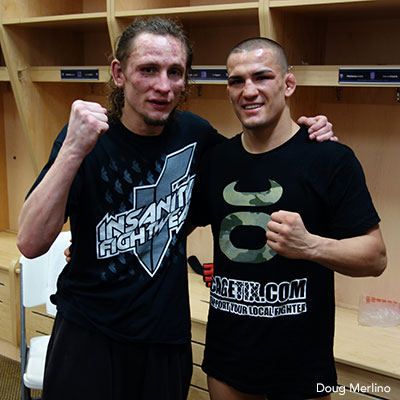
An older man with white hair stood in the front, waving a Bosnian flag and screaming. Two women in the adjacent section rose, pointed their fingers at the Bosnians, and told them to sit down and shut up. The rest of the crowd started its own chant: USA! USA! USA!
Mirso! Mirso! Mirso! the Bosnian fans countered. Ubijte ga! Ubijte ga! Ubijte ga!
"Jihad!" shouted one Bosnian.
A dozen yellow-shirted security officers and a handful of uniformed cops rushed between the Bosnians from Lincoln and the Kearney locals, forming a line to keep them apart.
Bektic sat on a stool in the cage as Barzini huddled beside him and gave instructions, calm and precise. Do not brawl with this guy. Wait for your opening, take him to the ground, get in position, and grind him down.
The second round began. Bektic charged again, landing a right cross that knocked Jenkins back against the cage. He took Jenkins to the canvas, got on top of him, and jammed an elbow into his face, opening a cut at the corner of his left eye.
Bektic stayed in position, grinding Jenkins with fists and elbows. Jenkins absorbed blow after blow.
The bell ended the second round. Jenkins, his face bloody and puffy, stood and waved his arms to rally the crowd.
USA! USA! USA! it roared.
The fans from the opposing cheering sections jostled to get at each other. Fed up, the security men grabbed the Bosnian supporters and, one by one, dragged them out of the arena.
In the cage, Bektic again took top position and pummeled Jenkins, who did his best to blunt the attack. Finally, after fifteen minutes of fighting, the bell ended the third and final round. Bektic pulled Jenkins to his feet, and the two exhausted fighters embraced.
Bektic won the unanimous decision. The crowd, now devoid of his fan base, jeered as his hand was raised.
Bektic hurried out of the arena, trailed by Kakai. Backstage, he crumpled in front of a locker.
It was the first fight in his career that had gone the distance -- he had not been able to finish Jenkins. And being perfect meant winning by submission or knockout. A unanimous decision wasn't good enough. On top of that, the Bosnians had embarrassed him. The "USA!" chants hurt, too: Wasn't he also an American?
He draped his sweat-suit top over his head and cried.
Sirwan Kakai hovered near him. He waited a few minutes and then spoke.
"You know what you did wrong, and that's good," he said. "Seriously, you did a great fight. You fought hard."
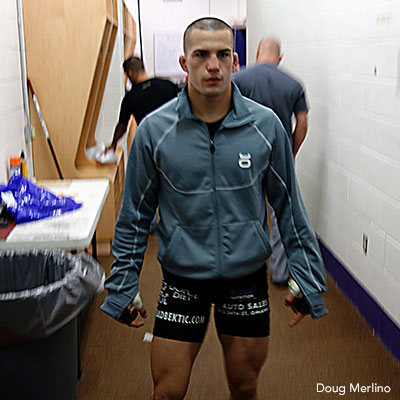
"I'm so much better than that," Bektic said. "So much."
"I've been in this position," Kakai said. "People expect you to win; it doesn't matter who you're going to fight, they expect you to fucking win. You're so hyped up now. And this is the thing, sometimes we face these tough guys, and we cannot expect to put them away."
"I've got to get back in the gym right away," Bektic said.
"No. You rest for three weeks," Kakai told him.
Barzini entered the locker room. "You did a great job," he said "Everything I told you after the first round, you did it."
"He got me against the cage for a few seconds," Bektic said.
"This kid was strong, man, this kid was strong," Barzini said.
As they spoke, Doug Jenkins slipped into the locker room, his face red, swollen, and cut. Bektic hugged him.
"Nice fight, man," Jenkins said, his voice a whisper.
"Thanks," Bektic said. "It's the toughest fight I had."
They posed for a photograph, arms around each other, making fists with their free hands.
"Thank you so much," Bektic said as Jenkins turned to leave. "Keep it up, man."
Ricardo Liborio, the head coach of American Top Team, called to congratulate Bektic.
Bektic stood with the phone to his ear, apologized, and cried again. He felt he had found a place where people cared and watched out for him, something he had not often felt in his life. He knew that he'd earned that attention through his performance in the cage. He was scared it could go away.
"You did great," Liborio reassured him.
"I'm sorry," Bektic said. "I'm sorry."
-- Excerpted by permission from BEAST: Blood, Struggle, and Dreams at the Heart of Mixed Martial Arts by Doug Merlino. Copyright (c) 2015 by Doug Merlino. Published by Bloomsbury. All rights reserved. No part of this excerpt may be reproduced or reprinted without permission in writing from the publisher. Available for purchase on Amazon, Barnes & Noble and IndieBound. Follow Doug Merlino on Twitter @dougmerlino.


